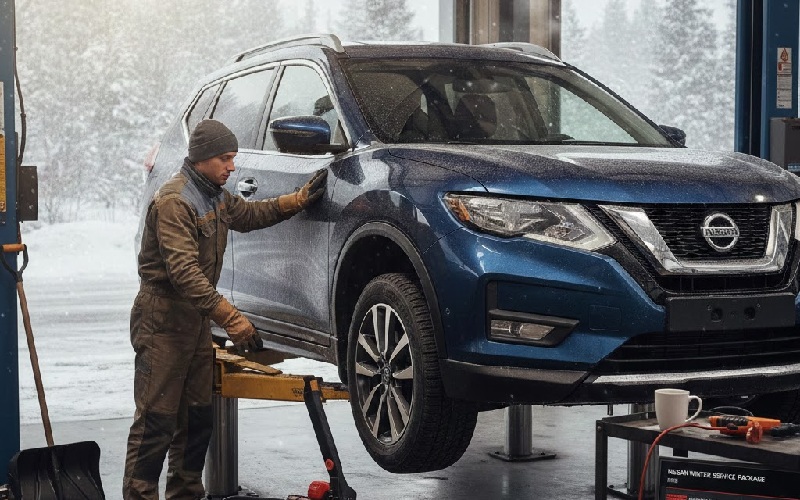Winter Vehicle Service: Maintenance in the Cold Season
Winter brings unique challenges for vehicle owners, with freezing temperatures, snow, ice, and salt creating a harsh environment for even the most reliable automobiles. Preparing your vehicle for these conditions isn’t just about convenience—it’s about safety, reliability, and protecting your investment. A comprehensive winter vehicle service routine can mean the difference between confident driving and […]
Winter brings unique challenges for vehicle owners, with freezing temperatures, snow, ice, and salt creating a harsh environment for even the most reliable automobiles. Preparing your vehicle for these conditions isn’t just about convenience—it’s about safety, reliability, and protecting your investment. A comprehensive winter vehicle service routine can mean the difference between confident driving and being stranded in potentially dangerous conditions.

Battery Maintenance and Testing
The cold season puts tremendous strain on your vehicle’s battery. At -15°C, a battery loses approximately 35% of its power, and at -30°C, it can lose up to 60% of its capacity. Before winter sets in, have your battery professionally tested to ensure it maintains sufficient cranking power. Technicians will check the battery’s charge capacity, clean any corrosion from terminals, and inspect the charging system to verify the alternator is functioning correctly. Batteries older than three years deserve particular attention, as they’re more likely to fail during cold snaps.
Fluid Checks and Replacements
Winter vehicle service pays specific attention to your vehicle’s vital fluids. The coolant system needs special consideration—a proper mixture of antifreeze and water (typically 50/50) protects your engine from freezing in temperatures as low as -40°C. Technicians will test the coolant’s freezing point and condition, replacing it if necessary.
Other critical fluids to examine include:
- Transmission fluid, which can thicken in cold temperatures
- Brake fluid, which absorbs moisture over time and can freeze if contaminated
- Power steering fluid, essential for maintaining control
- Winter-grade washer fluid rated to at least -40°C, a critical safety component for visibility
Winter Vehicle Service Tire Installation
Perhaps the most significant winter vehicle service is the installation of proper tires. These specialized tires utilize rubber compounds designed to remain flexible in freezing temperatures, unlike all-season tires that harden when cold, reducing traction. Winter tires feature specialized tread patterns that provide improved grip on snow and ice, with numerous sipes (small slits) that create biting edges for enhanced traction.
For optimal performance, winter tires should have a minimum tread depth of 4 mm. During installation, technicians will also check tire pressure, as it decreases in cold weather, approximately 1 PSI for every 5°C drop in temperature. Properly inflated tires improve handling, traction, and fuel efficiency.
Brake System Inspection
Winter driving demands peak braking performance. A comprehensive brake service includes inspecting pads, rotors, callipers, and brake lines. Technicians will measure pad thickness, check for rotor warping or scoring, test the calliper operation, and inspect the hydraulic system for leaks or other issues. You should replace any components showing significant wear before driving conditions add extra stress to the system.
Visibility Systems Service
Winter brings reduced daylight hours and challenging visibility conditions. A thorough inspection of all lighting systems ensures you can see and be seen. This includes headlights (both high and low beams), fog lights, tail lights, brake lights, turn signals, and hazard lights.
The wiper system also requires special attention. Winter-specific wiper blades feature a robust rubber shell that prevents ice buildup and maintains contact with the windshield in extreme conditions. Technicians will also inspect the wiper motors and verify that the washer system is functioning properly with sufficient winter-grade washer fluid.
Exhaust System Check
An often-overlooked but critical winter vehicle service is a thorough exhaust system inspection. Vehicles are more frequently operated in closed environments (such as warm-up in garages), making the integrity of the exhaust system a safety priority. Technicians will check for leaks, corrosion, or damage that could allow deadly carbon monoxide to enter the cabin.
Heating System Evaluation
The heating system is more than just a comfort feature in winter—it’s essential for safety, as it maintains proper visibility through its defrosting functions. A winter vehicle service includes testing the heater core, blower motor, and climate control systems to ensure they operate at maximum efficiency. This also includes checking cabin air filters, which can restrict airflow if clogged.
By committing to these essential winter vehicle services, you’ll ensure your vehicle remains reliable, efficient, and safe during the challenging months ahead.
Things You Might Not Know About Winter Service
- Modern engines with direct injection technology are particularly susceptible to carbon buildup during short trips, requiring specialized fuel system cleaning services every 25,000 kilometers
- Winter-specific brake pad compounds exist that maintain stopping power at freezing temperatures, offering up to 40% improved braking performance below -20°C compared to standard pads
- The salt used on icy roads accelerates corrosion at connection points in your vehicle’s electrical system, making electrical system inspections particularly important for vehicles over 5 years old
- Winter tires can reduce braking distances on snow by up to 40% compared to all-season tires, and the difference increases further as temperatures drop below -10°C
- Modern synthetic oils designed specifically for cold-weather use can improve cold-start fuel efficiency by up to 5% and reduce engine wear during the critical warm-up period by nearly 60%
Frequently Asked Questions About Winter Vehicle Services
When is the best time to schedule winter vehicle service for my vehicle?
- Ideally, 2-4 weeks before the first expected snowfall or freezing temperatures. This timing allows for any needed parts to be ordered and ensures your vehicle is ready before the first cold-weather event.
Is it necessary to switch to winter tires if I have all-season tires?
- Yes, particularly in regions where temperatures regularly fall below 7°C. All-season tires harden in cold temperatures, significantly reducing traction. Snow tires provide up to 50% more traction on snow and ice, dramatically improving safety.
How often should I check my tire pressure during winter?
- Check tire pressure at least twice monthly. Cold temperatures cause pressure drops, and properly inflated tires provide better traction, handling, and fuel efficiency in icy conditions.
Why does my battery seem to die more quickly in winter?
- Cold temperatures reduce a battery’s ability to produce the electrical current needed to start your vehicle. Additionally, cold-weather driving typically involves more electrical demand (headlights, heater, defrosters) while shorter daylight hours give the alternator less time to recharge the battery.
Do I need to warm up my car before driving in winter?
- Modern vehicles need minimal warm-up time—typically, 30-60 seconds is sufficient. Excessive idling wastes fuel and increases emissions. The best way to warm up your engine is to drive gently for the first 5-10 minutes.
How does winter affect my vehicle’s oil?
- Cold temperatures cause oil to thicken, creating more resistance in the engine and making it harder for the oil to circulate properly during startup. Cold-weather-grade oils or synthetic oils exhibit better flow properties in cold temperatures, offering enhanced protection.
How often should I wash my vehicle during winter?
- Wash your vehicle every 7-10 days, paying special attention to the undercarriage. This removes road salt and chemicals that accelerate corrosion of metal components.
Is it worth getting an engine block heater installed as part of winter service?
- In regions where temperatures regularly fall below -15°C, an engine block heater is highly beneficial. It keeps the engine oil warmer, easing cold starts, reducing wear, improving fuel efficiency, and allowing the heater to provide warm air more quickly.
What should I do if my vehicle’s winter service reveals multiple issues requiring repair?
- Prioritize safety-related systems first: brakes, tires, steering, and exhaust. Next, address items that could leave you stranded, like the battery and cooling system. Finally, handle comfort and convenience systems.
How do winter driving conditions affect my brake system?
- Cold-weather conditions create additional stress on brake systems through exposure to salt, moisture, and more frequent emergency braking situations. This can accelerate wear on pads and rotors, introducing moisture into the hydraulic system and potentially causing corrosion.


